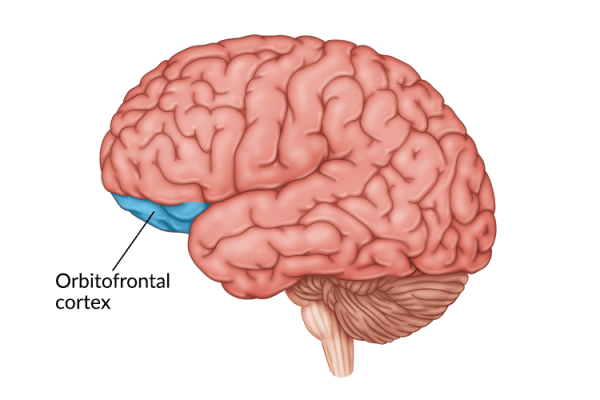Perseveration after brain injury can cause someone to continuously repeat actions, words, or thoughts. It is thought to occur due to changes in memory, attention, and cognition after a traumatic brain injury (TBI).
Today’s article will explain the causes and types of perseveration after TBI. We’ll also discuss how family members can help their loved ones manage their behaviors.
Definition and Causes of Perseveration
Perseveration is a thought disorder that causes multiple repetitions of a word, phrase, or gesture after they have stopped being appropriate. It also involves the inability to shift goals or tasks when required.
Perseveration after brain injury is caused by damage to the frontal cortex, which controls a person’s self-awareness and inhibition. Without those skills, a person who perseverates finds it difficult to stop a particular action and switch to another.
In other words, perseveration is related to one’s inability to easily switch from one cognitive task to another. Normally, people can smoothly transition between tasks and thoughts in order to hold conversations or solve problems.
Without this ability, individuals can become “stuck” on certain thought patterns or activities. In these situations, they are unaware of their perseveration and are not able to control it. Unfortunately, it can lead to problems within one’s personal or professional life.
Types of Perseveration
The three most common types of perseveration after brain injury are:
- Stuck-in-set: The uncontrolled or extended maintenance of a thought, activity, or topic in conversation, despite the situation changing.
- Recurrent perseveration: The unintentional and unfocused repetition of a behavior. For example, a person with recurrent perseveration might write the same word or letter multiple times for no apparent reason.
- Continuous perseveration: The uncontrollable repetition of an impression or feeling. An example of this is someone who continues to dwell on their anger longer than the situation warrants.
All people experience perseveration to one degree or another. For example, when a song gets stuck in your head, you are actually perseverating. But after a brain injury, perseveration becomes more pronounced and uncontrollable.
Examples of Perseveration After Brain Injury

Perseveration can manifest in different ways, and no two people will experience the exact same presentation.
For example, a person with perseveration might continue shaking hands for longer than what is deemed to be socially acceptable. Others might continue to clean an object longer than necessary.
Most of the time, however, perseveration occurs during conversations or social interactions, when the person cannot switch between ideas or responses. They might also repeat the same words and phrases.
Other examples include behaviors such as:
- Repeatedly switching T.V. channels
- Putting food in their mouth without stopping to chew or swallow
- Writing the same word or phrase over and over
- Putting on and taking off an item of clothing
Sometimes, perseveration is not accompanied by physical actions. Rather, the person will obsess over a thought until they can no longer function normally.
It’s important to realize that perseveration after brain injury is not a behavioral problem, but a cognitive one. Therefore, trying to convince the person to “snap out of it” will not be successful and may worsen the situation.
Treating and Managing Perseveration
Because there are many varying degrees of perseveration, treatment will require comprehensive evaluation by a neuropsychologist. You may also work with an occupational therapist to develop some helpful coping strategies.
Some of the best interventions for perseveration include:
- Cognitive-behavioral therapy
- Group therapy
- Medications
One of the most helpful cognitive therapy tactics for perseveration is a technique known as thought stopping. This refers to the use of a visual cue or action that can prevent perseveration from taking hold. For example, some people snap a rubber band on their wrist when they start to perseverate.
Helping Someone Who is Perseverating

It can be difficult to watch a loved one perseverate. Fortunately, there are some helpful strategies you can do to stop perseveration in another. Some examples include:
- Recognize. Teach the person how to recognize when he/she is beginning to perseverate as well as how to ask for help. You can also create a “stuck signal” that alerts the person when they are stuck.
- Simplify. Give simple, clear instructions on what the person needs to do. For example, if they can’t stop brushing their teeth, tell them to put the brush in your hand, relax their fingers, etc.
- Offer praise. If they manage to stop perseverating, reinforce this behavior with positive comments.
- Set a time for perseveration. If the person tends to obsess over a certain topic, schedule a time when they can talk or think about it freely. But emphasize that when the time is up, they must stop. Set an alarm so they know when their time limit ends.
These are just a few examples of tactics you can use to reduce perseveration in a loved one after brain injury. But since every case is unique, you should consult with a specialist for individualized advice.
Understanding Perseveration After Brain Injury
Perseveration is commonly seen as a secondary effect following a traumatic brain injury. It causes patients to engage in repetitive and compulsive thoughts and behaviors.
This can be harmful to a person’s relationships and even their health, depending on the type of perseveration they engage in.
Fortunately, with the right support, patients can learn to recognize and reduce their perseverative behaviors after brain injury.










